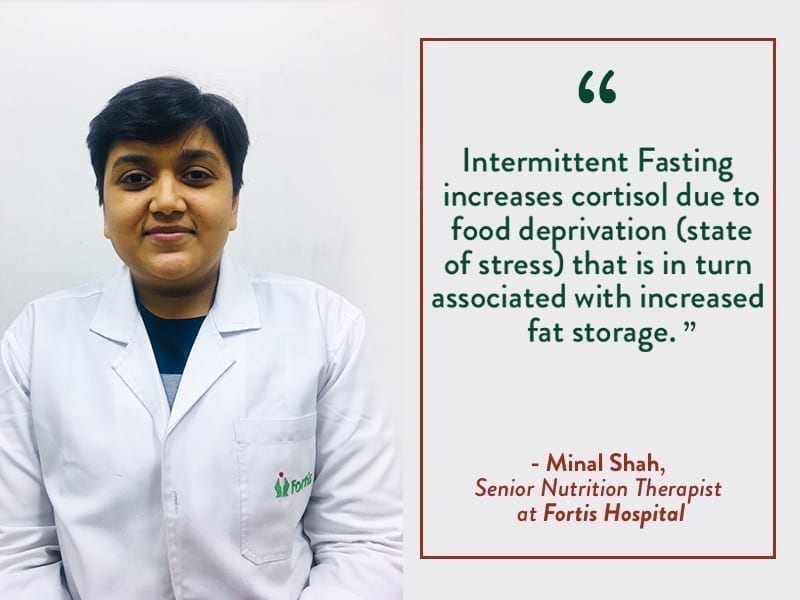Fasting has been an integral part of the festival of Ramadan. Apart from lowering cholesterol, and preventing heart disease and obesity, intermittent fasting has a ton of benefits.
Here, to discuss the benefits of intermittent fasting, the effects of long-term fasting and tips about weight loss and metabolism, are two experts; Ms Minal Shah, Senior Nutrition Therapist at Fortis Hospital, Mulund and Ms Honey Thaker, Head Nutritionist – Fitness Science & Nutrition at Pure Nutrition.
1. What Effects Does Intermittent Fasting Have On Weight Loss And Metabolism?
Minal Shah: Intermittent fasting, which is fasting and the eating cycle causes insulin levels to drop. Drop-in insulin levels cause a metabolic switch from glucose as a fuel source to fatty acids and ketone bodies as fuel during the fasting period. The benefit of Intermittent Fasting includes glucose regulation, blood pressure, heart rate, efficiency of endurance training and abdominal fat loss but no evident effect on weight loss. Intermittent Fasting has the best effects when combined with calorie restriction to reverse the effect of obesity, diabetes, and cellular stress resistance.

2. What Changes Does The Body Go Through When We Fast For A Month?
Honey Thaker: During the month of fasting your body goes through a series of changes. Initially, your blood sugar levels and blood pressure may start showing some benefit and your body begins the cleansing process. After a few days, the body is accustomed to fasting and the digestive system knows the rest time and working time. The WBCs during this time become more active, boosting your immunity. After around 10-15 days of fasting, the colon, liver, kidney, lungs, and skin show signs of detox. You become more energetic and experience improved memory and concentration. These are just a few of the many things that happen in your body during one month of fasting. However, there’s a lot more to be explored and studies are still being done to find more benefits and effects of Ramadan fasting on the human body.
3. Are There Any Negative Effects/Side Effects Of Fasting For Long Periods? How Can They Be Managed?
Minal Shah: Since it’s time-restricted and calorie-restricted eating there is a potential risk of not meeting the nutritional requirements in terms of protein, vitamins, and minerals as per the Recommended Dietary Allowance. Reduced protein intake can lead to hair loss, muscle weakness, and reduced immunity. Intermittent Fasting increases cortisol due to food deprivation (state of stress) which is in turn associated with increased fat storage. Other negative effects include orthorexia or obsession with healthy eating and a disturbed sleep cycle that reduces REM sleep which is important for memory. Not eating can also lead to irritability and decreased alertness, dizziness which can impact your routine functioning and work. Consult a dietitian to ensure a balanced diet plan to meet the nutritional needs with lifestyle modification and intervention with adequate information and ongoing communication with timely positive reinforcements.
4. What Are The Different Patterns Of Fasting And Their Effects On The Body?
Honey Thaker: There are many different types and patterns of fasting. To name a few, there are 5:2 fasting, time-restricted fasting, overnight fasting, eat-stop-eat (done during Ramadan), whole-day fasting, intermittent fasting and alternate-day fasting. The pattern or the type of food involved in each of the diets may be different, but all of them serve, more or less, the same benefits. They help with blood pressure, and cholesterol, help lose weight, and detox the body. Some types of fasting may work better for others, so it is important to consult a dietitian to guide you better as to which type will give you the best benefits if you have a fixed goal in your mind. An expert will also suggest the right foods, portions and quantities to have when you are breaking the fast. However, if you have any medical conditions it is always suggested to avoid or seek right guidance.

5. How Does Fasting Affect Women’s Health In Terms Of Blood Sugar, Muscle, And Bone Health?
Honey Thaker: Intermittent fasting like Ramadan fasting can affect men and women differently, there are many studies that show this. One study showed that sugar control is actually worsened in women. At times, it also disrupts the menstrual cycle. These changes occur because female bodies are extremely sensitive to calorie restriction. Low intake of calories affects the hypothalamus in the brain that can disrupt the secession of gonadotropin-releasing hormone (GnRH), a hormone that helps release two reproductive hormones: luteinising hormone (LH) and follicle-stimulating hormone (FSH).
As far as bone health is concerned, it still remains a debatable topic, as many types of research found that there weren’t any significant changes in bone density in the case of alternate-day fasting. While other studies say that intermittent fasting can decrease bone density in women, it can be recovered easily after the fast ends.
If women wish to fast, they must consult their nutritionist and add the right foods and supplements to ensure optimal health.
Read more about what happens in your body when you are fasting for Ramadan.

